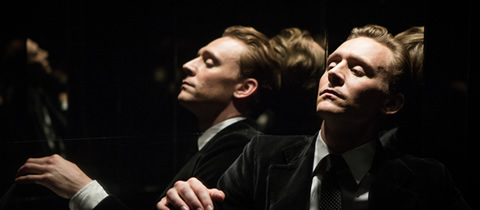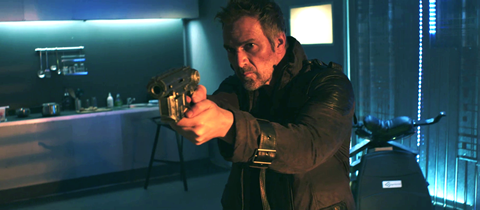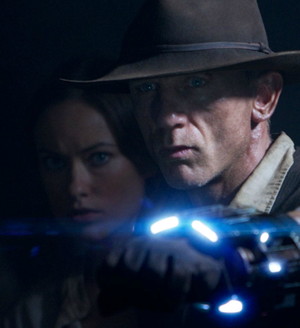(First published on Blogcritics.org)
When you become aware of a car crash on the side of the road, you don’t want to look, but you do and then you can’t turn away from the horror you are seeing. That’s how I began to feel as I became immersed in the world of High-Rise.
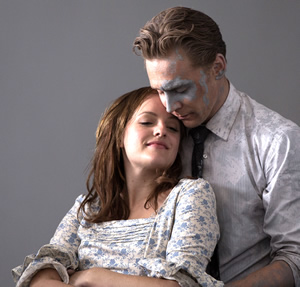
I watched High-Rise, a film by British director Ben Wheatley (Kill List, A Field in England), totally unaware of its source and inspiration. I was attracted to it by the impressive cast, which includes Tom Hiddleston, Jeremy Irons, Sienna Miller, Luke Evans, Elisabeth Moss, and James Purefoy. Ironically, my feeling that I had been sucked into watching a seductive car crash proved insightful.
High-Rise is based on the novel of the same name by J.G. Ballard. Ballard (1930-2009), hailed as a key figure in the sci-fi New Wave movement, also penned Crash, a tale about people who become sexually aroused by staging and participating in real car-crashes. That novel was made into a film by David Cronenberg. A third Ballard novel, Empire of the Sun, was brought to the screen by Stephen Spielberg.
High-Rise takes place in a dystopian near future. The novel was written in 1975. In adapting it for the screen, Wheatley and screenwriter Amy Jump (a.k.a. Mrs. Wheatley) chose to keep the film in the 1970s. The sight of old phones and small tube based televisions was slightly disconcerting, till I caught on. Life in High-Rise was seductive, beautiful, and like its soul-mates Brave New World and 1984, allegorical, although with a more left-wing, even anarchist, slant.
Seductive
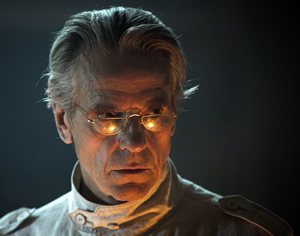
We first meet Laing, the protagonist, as he lounges around on his balcony in the upper floors of the high-rise. However, something is wrong. He seems perfectly content in what is a ruin, with a severed head as part of the décor. Then the film takes us to “Three Months Earlier.”
At that point, Laing, an eligible bachelor and doctor, played by Tom Hiddleston (Thor, The Avengers), was moving into his new home in the high-rise. Soon, he is sunbathing nude on his balcony. He discovers he is being spied on from above by Charlotte, played by Sienna Miller (American Sniper, Stardust), a young urban professional and sexy, single mom.
Laing’s interactions with Charlotte and other tenants of the high-rise drives the story forward. Performances by the ensemble cast portraying the tenants were impressive. Jeremy Irons (Lolita, The Lion King), plays Royal, the architect and owner of the high-rise and occupant of the penthouse suite. Luke Evans (Furious 7, The Hobbit: The Desolation of Smaug) plays Wilder, a rebellious documentary filmmaker with too much testosterone. Elisabeth Moss (Mad Men, The Free World) plays Helen, Wilder’s always-pregnant wife. What does a pregnant lady need? A gynecologist. The high-rise has one of those, too, known for his cold hands, played by James Purefoy (The Following, Rome).
Louis Suc (Mike the Knight) deserves special mention. He plays Toby, Charlotte’s son, and, as often happens with child actors, he gets many of the best lines.
Beautiful
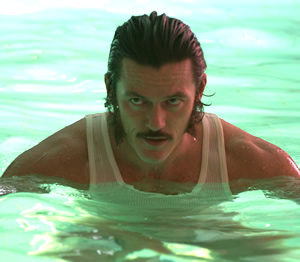
As I became confused and disoriented watching the film, like the tenants in the story, one of the things that kept me from turning away and giving up was cinematography and editing. Director of Photography Laurie Rose and the editors (Wheatley and Jump) created a visual tour-de-force. What makes this more of an accomplishment is that the setting was not so beautiful.
London, where the story is set, no longer looks like 1970s London. The filmmakers found a location in the Northern Ireland seaside town of Bangor. Its Leisure Centre, designed in 1970, evoked the brutalist-style architecture needed for the story. The penthouse garden was shot in the Walled Garden of Bangor Castle.
The editing, although it could have been tighter, excels at visual storytelling. The story often proceeds without dialog, just the movements and reactions of the actors. A moment that particularly stands out in my mind is a series of shots of Hiddleston. A tracking shot whirls around him, followed by a close-up and an extreme long shot. This is one of those “That shouldn’t work, but it does” moments.
Allegory
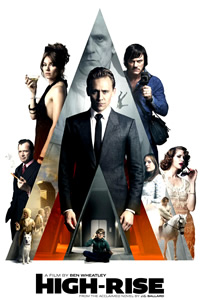 I don’t want to spoil anything, but you may have noticed that the architect living at the top of the structure is named Royal. The documentary photographer who eventually leads a revolt of people from the lower floors is named Wilder. The world these people live in begins to fall apart when the building – the structure – begins to fail.
I don’t want to spoil anything, but you may have noticed that the architect living at the top of the structure is named Royal. The documentary photographer who eventually leads a revolt of people from the lower floors is named Wilder. The world these people live in begins to fall apart when the building – the structure – begins to fail.
What about the protagonist, Doctor Laing? The other names were obvious. I researched “Laing” and discovered that in the period in which Ballard wrote the novel, there was a prominent Scottish psychiatrist named R.D. Laing. I found one quote from the real Doctor Laing that explained the fictional Doctor Laing: “Insanity – a perfectly rational adjustment to an insane world.”
That can’t be a coincidence.
High-Rise, rated R for violence, disturbing images, strong sexual content, nudity, language, and drug use, can be found in theaters and on Amazon and iTunes.

